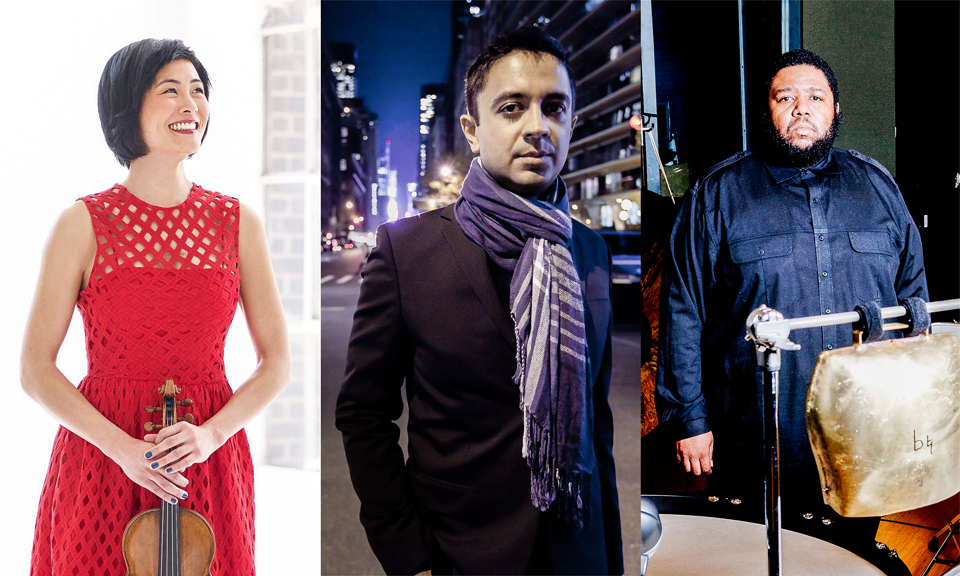
DIVERSITY ON MANY LEVELS
Please don’t say avant garde. The PIVOT concert series is defined as “Our adventures in chamber music,” per the program director Melanie Smith. With it, San Francisco Performances mixes the old with the contemporary and experimental. On Jan. 24 it also entailed solos and duets that were partly or fully improvisational, drawing a sizable audience.
Despite resplendent performances by the trio, most of the audience remained gratuitously in the dark. The printed program ended up so scrambled, by the end my copy looked like an elaborate trick play drawing for a football playoff, without explanatory audibles. And no one announced the substitutions: Now Norman, not Sorey; now Iyer, not Bach; an added Sorey improvisation; now Koh paired with Iyer; and, en route, two composers’ works run together without a break. Can any one pass me a vetted scorecard??
The music of and by Tyshawn Sorey at a solo celeste keyboard recalls earlier near-static pieces by Morton Feldman and Toru Takemitsu in the 20th century. It is a music of meditation, restful and slow-moving, often one note at a time, a portal to the world of Zen. The celeste offers precious resonant notes like water droplets falling from a high reverberant cave chamber into a turquoise lake. In playing his composition “In Memoriam Muhal Richard Abrams,” he called it partly improvisational, shifting with each playing.
Yet more amazing was the unorthodox improvisational duet, with Iyer at a grand piano and Sorey on celeste. With Sorey making restrained aphorisms, the nimble Iyer kept eyes shut and offered a consonance of rolling chords in a harmonious filigree, slightly jazz-inflected as cross-over music. This was a shimmering collaboration, harmonious, and devoid of collisions, such as you’d never dream possible.
In “The Diamond” by Iyer (pronounced “Ire”), the pianist paired with violinist Koh, with the piano often providing a sonic carpet while the violin spins its comments unobtrusively toward the high end of a four-octave range. Much of the result is highly romantic, with Iyer interpreting early Buddhist texts from “The Diamond Sutra,” explaining the philosophy in program notes.
This trio appears to represent the bloom of multi-cultural America today—diversity rules. Where formerly touring trios were usually all Caucasians, often from the same conservatory, that conformity is no longer the mandate. That old mold is now totally broadened, with heritages from around the world: Korean background at violin, an immensely versatile South Asian on piano, and on celeste, a mountain of a heavy-set, African-American bearded man who is a performer-composer. Their interplay is secure and consistent, as if this were their destiny. I say absorbing it from Row K, opposites attract.
Violinist Jennifer Koh stands out as a leading architect of contrasting old-new programs. She led off with the baroque era’s ne-plus-ultra virtuoso piece, the Bach Partita No. 2 containing the ferocious quarter-hour-long, unaccompanied Chaconne. Here with double-stops and arpeggios she sounds like two instruments in duet, flying through the score with spot-on intonation and tone. She followed this with Missy Mizzoli’s modern response to the Bach, the impulsive “Dissolve O My Heart” (2011), a demanding, sensual work with dance-like inflections and jazz influence, fading out in ppp with that mysterious ending.
The four-concert string-emphasis PIVOT series had opened with an earnest recital by Stefan Jackiw, violin, and Mahan Esfahani. Hearing 20th-century pieces by Viktor Kalabis and Walter Piston with a harpsichord was a revelation, but the imbalance was regrettable: Even given a wizard like Esfahani, the effect was lost as the delicate keyboard was swept away by the assertive modern violin.
PIVOT FESTIVAL of four concerts, “String Theory,” Jan. 23-26, Herbst Theatre, San Francisco, under S.F. Performances auspices. For SFP info, call (415) 677-0325 or go online: www.sfperformances.org.